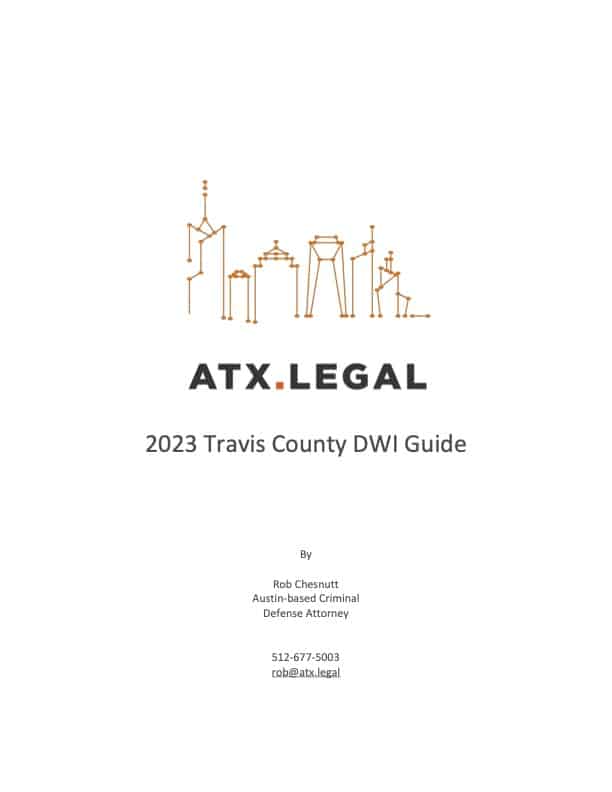2023 Travis County DWI Guide Part 5 - Plea Negotiations and Possible Outcomes
Since most DWI cases do not go to trial, plea negotiations are especially important. Depending on the exact facts or severity of the charges, plea negotiations will have different starting points. Sometimes the offers from the Defense and Prosecutor will “meet in the middle”, while other times, negotiations will break down and we will set the case for trial. DWI Diversion Court, discussed below, is also a good option for many.
Starting Point for any case: Can we get a dismissal?
In every case, I look at the dismissal first. We can arrive at a dismissal in various ways. Is there a problem with the probable cause for the traffic stop or some other issue with the state’s evidence? If so, I attack this element and push for a dismissal. A second way to push for a dismissal is if we have relatively mild facts. Perhaps the BAC level is barely over .08 or maybe there is no BAC reading at all. Maybe this is a first time arrest and there was no unsafe driving observed.
With these factors, I might ask my client to complete court-ordered classes before asking for a dismissal. In some cases, I might offer 6 months of IID. For many clients, it is worth the hassle of having an IID for 6 months if it means a clear criminal history. In other cases, we can offer a “class C refile”, meaning you plea guilty to a traffic ticket, but the DWI is dismissed.
DWI Diversion Court – Dismissal with extra steps
Last year, the new County Attorney Delia Garza revamped DWI Court. In the past, it was an overly-burdensome, expensive process which I rarely recommended. Now that has changed, and I do recommend it to many clients. The end result is a dismissal, which is a great reward, but does come with some conditions.
DWI Court requires an application, and not everyone is accepted. Class A and B misdemeanors can be eligible, though second-time DWIs are not eligible. The BAC for class A misdemeanors must be under .20. Also, even minor collisions can keep you out of the program.
Once accepted, you will be required to install an IID (or PAM/SCRAM if no vehicle). These devices are discussed in more detail in the section on bond conditions. There may be community service requirements, though these were waived during the pandemic. You cannot receive a new criminal charge while on the program, or you risk being kicked out. The devices are burdensome, but in this case, the reward is usually worth it – a dismissal after 6-12 months with no violations.
Second Best – A dismissal (but not exactly)
If the facts are a little bit worse, but still mild, I might ask for a compromise. In these cases, we can ask the prosecutor to refile as “Obstructing a Roadway”. It’s milder than a DWI, but still a class B misdemeanor. Often, there is still probation involved. The upside is that the DWI is off your record. Note – a new interpretation of Texas law DOES allow you to expunge the DWI arrest even when convicted for Obstructing a Roadway.
The downside is that many people will look at the criminal history and guess exactly what led to the Obstructing charge. Still, an obstructing is not a DWI, and a number of consequences that go with a DWI conviction do not carry over to the Obstructing charge.
Next Option – Deferred Adjudication and Probation
With both probation and deferred adjudication, you will have to report to a Probation Officer (PO), pay probation fees (about $60 per month), perform CSR, take classes, and obey various other conditions depending on your charge. Additionally, you might need to spend time in jail as a condition of probation (ACOP). Importantly, days spent ACOP are not softened with the 2-for-1 rule. Instead, these are served “day-for-day”. If you receive 10 days ACOP, you will serve all 10 days, but you do get credit for time already served. Another wrinkle that is specific to DWI probation is that it cannot be terminated early.
The biggest difference with a deferred adjudication as opposed to probation is that you do not receive a conviction. However, the benefit of deferred adjudication is somewhat limited because an expunction is not available. You can seal the record with an order of non-disclosure, but the arrest remains on your record for certain parties to see.
Conviction with Jail Time
Although many clients shy away from a jail sentence, it can sometimes be a good option to escape a lengthy probation with it’s fees and conditions. Sometimes the jail sentence can be as short as one night in jail, which is basically a check-in and check-out. Although everything is on a case by case basis, for some clients, a short jail stay makes sense.
DWI “Superfine”
Anyone considering probation or a conviction with jail time should be aware of the DWI “superfine”, which is $3000-6,000, and is mandatory for any “final conviction”. Some judges will waive this fine for indigency, but you should discuss this with your attorney before accepting this plea. Whether this fine can be waived, and in what circumstances is very dependent on which court the charges are pending.

